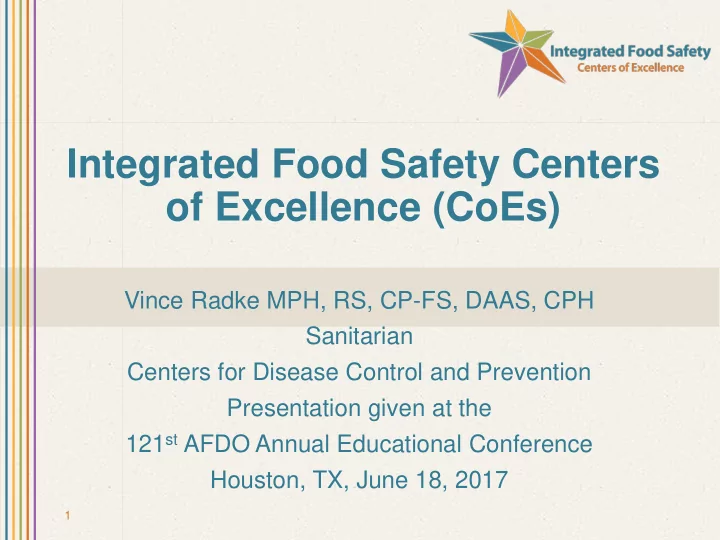

Integrated Food Safety Centers of Excellence (CoEs) Vince Radke MPH, RS, CP-FS, DAAS, CPH Sanitarian Centers for Disease Control and Prevention Presentation given at the 121 st AFDO Annual Educational Conference Houston, TX, June 18, 2017 1
What do the CoEs do? The Integrated Food Safety Centers of Excellence (CoEs) were established under the Food CoEs assist many health Safety Modernization Act departments by: (FSMA) to: • Providing in-person and “… serve as resources for online trainings federal, state, and local • Developing resources and public health professionals tools to respond to foodborne illness outbreaks.” • Giving technical assistance to health departments “… provide assistance to OTHER regional, state, and local departments of health …”
Who are the CoEs? Colorado New York Colorado Department of Public New York State Department of Health and Environment Health Colorado School of Public Health Cornell University Florida Oregon Florida Department of Health Oregon Public Health Division University of Florida Oregon State University University of Georgia University of Minnesota Minnesota Tennessee Minnesota Department of Health Tennessee Department of Health University of Minnesota University of Tennessee
How do I work with a CoE? When you don’t know where to start, contact your regional Center . Centers serve as navigators between the health departments in their region and the resources and services provided by the Centers of Excellence
Where are CoE Products? Over 100 CoE tools, courses, and products are available at http://www.coefoodsafetytools.org/AllCoEProducts.aspx CoEFoodSafetyTools.org
Environmental Assessment Trainings (CO) • QuickTrain • Four 15-minute modules • Introduction to Foodborne Outbreak Investigations • Overview of Environmental Assessments • Contributing Factors • Clinical and Environmental Specimens • Refresher or basic introduction • Certificate & CEUs • Just-in-Time Training • 12 core topics organized around tasks (non sequential) • Interviewing: food workers, managers, cases • Sampling: clinical specimens, food, environmental • Site visit: observations, record review, contributing factors • Control measures: exclusions, implementing control measures, concluding the investigation
Online Videos (FL) • Gap for new/novice investigators • Developed overview of training series • Foodborne Illness: What Problem? • Protecting the Food Supply: Federal Partners • Protecting the Food Supply: State Partners • Foodborne Outbreak Investigation: What does an epidemiologist do? • Foodborne Outbreak Investigation: What does an environmental health specialist do? • Foodborne Outbreak Investigation: What does a laboratorian do? • Overview of a foodborne outbreak investigation
Web-based Training (TN) • Web-based training courses in foodborne outbreak detection and response • 3 of 7 courses released to-date • Developing synergistic in-person activities to build team component of outbreak skills learned in online courses http://foodsafety.utk.edu/training.php
Stool Collection Videos • For Health Care Providers (TN) • For Patients (OR)
Food Source Information Wiki (CO) • Rapid access to basic information on food production practices • Bridge knowledge gap and improve outbreak response • Experts in agricultural production or food safety write an article (or part of an article) that is then reviewed internally and externally • Other resources • PPOD • Outbreak Museum
Key Points (MN) for Successful Foodborne Outbreak Detection and Investigation • One page resources documents showing Minnesota’s processes for surveillance and outbreak response • Key Points for Product Tracing in Epi Investigations Part 1 • Key Points for Product Tracing in Epi Investigations Part 2 • Key Points for Food Transaction Records from Credit or Debit Cards • Key Points for Creating a Team of Student Workers • Key Points for Investigating Sub-Clusters • Key Points for Creating a Foodborne Complaint System
How do I learn more about the CoEs? • Quarterly Newsletter Centered on Food Safety • Twitter @FoodSafetyCoE • List serv • www.cdc.gov/foodsafety/centers/index.html
Thank You Questions? Vince Radke vradke@cdc.gov 13
Recommend
More recommend